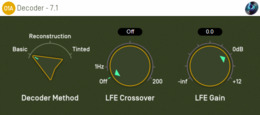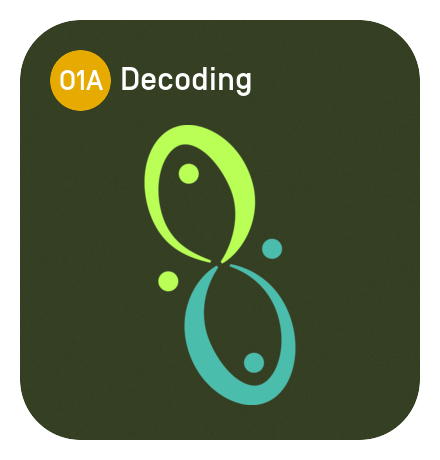
O1A Decoding
The O1A Decoding plugins decode (or "render") first order ambisonics (O1A) to various other standard formats such as stereo, 5.1 and beyond.
These aren't the plugins you're looking for, probably. If you are working with other O3A (third order ambisonic) plugins or material then you should normally use the O3A Decoding plugins rather than the O1A ones.
Decoders are included for mono, stereo, 5.1, 7.1.2 (Dolby Atmos), 7.1.4, 9.1.6, 3D7.1, Auro-3D, IMAX, 22.2, Cube, Hexagon and more.
These are VST2 or AAX plugins for macOS (10.14 to 13.5) or Windows (10 or 11, 64bit Intel). They can be hosted in some Digital Audio Workstations (DAWs) that can handle tracks with sufficiently high channel counts. Options include Reaper, Pro Tools (Ultimate or Studio), Pyramix and Max/MSP. These plugins use the SN3D higher order ambisonic (HOA) convention, at first order, which needs 4 channels. The exact channel counts needed for individual plugins are listed below in the Plugins section. Not all plugins are supported in AAX.
We use some free software, data and artwork in these products. Before purchase, please check the technical requirements and license agreement. Prices include VAT where applicable. EU VAT is normally charged at your local rate using the MOSS VAT system. By beginning the payment process you agree to be bound by our terms and conditions.
Decoding 3D O1A Audio
If you're not sure of the difference between O1A and O3A, or what ambisonic decoding is, then please take a look at the O3A equivalent to this library. The O1A library is provided for those who are sure they want to work with the first order format, for instance because of legacy material or because of first order recordings that are not to be converted to third order. Normally, O1A is significantly less sharp than modern O3A.
If you wish to decode both first and third order material, for instance because of a combination of recordings and panned material, you can use the O1A and O3A Decoding libraries in parallel. The O1A and O3A decoders are carefully matched to give consistent results. However, it is often better to convert O1A material to O3A. Methods for converting O1A to O3A include the first order injector from the O3A Upmixers plugin library, the O3A Harpex Upsampler, or just mixing the O1A stream into the O3A directly.
You might also be interested in Rapture3D "Advanced", which lets you set up large irregular custom layouts. The plugins provided can be set to decode first, second or third order.
Multichannel Decoders
The decoders for surround sound layouts (5.1, 7.1, 7.1.2, 3D7.1, Auro-3D, IMAX, 22.2 and some others) have been built using the Rapture3D decoder generator.
Stereo Decoders
A simple stereo decoder is included, with two modes.
Headphone Decoder
This decoder uses the Rapture3D's Amber HRTF data set to produce binaural 3D on headphones. This HRTF has been built using a parameter-space average of a large number of heads to produce a "standard" HRTF that works for many people.
Format Conversion
If you have material in classic ambisonic B-Format (also known as first order FuMa) this can be converted to the SN3D ambisonic convention used by the O1A plugins with the O1A Injector - FuMa plugin included.
Binaural Decoding
O1A Decoder - Headphones

I/O: 4 in, 2 out
This plugin synthesises high quality binaural headphone audio from 3D O1A mixes.
Loudspeaker Decoding
O1A Decoder - Stereo
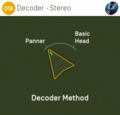
I/O: 4 in, 2 out
This plugin renders robust, high quality stereo from 3D O1A mixes.
Please note that this is not a binaural decoder.
O1A Decoder - Quad
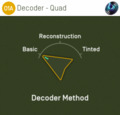
I/O: 4 in, 4 out
This plugin renders high quality four-channel surround for a quad array from 3D O1A mixes.
O1A Decoder - 5.1

I/O: 4 in, 6 out
This plugin renders high quality 5.1 surround from 3D O1A mixes. The corner speakers can be set out in a square or at standard ITU angles.
O1A Decoder - 7.1.2 (Dolby Atmos)
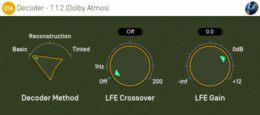
I/O: 4 in, 10 out
This plugin renders high quality 7.1.2 surround from 3D O1A mixes.
O1A Decoder - 7.1.4
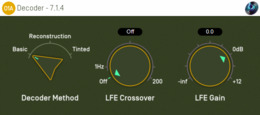
I/O: 4 in, 12 out
This plugin renders high quality 7.1.4 surround from 3D O1A mixes.
O1A Decoder - 9.1.6
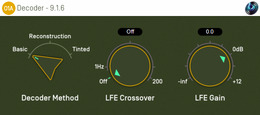
I/O: 4 in, 16 out
This plugin renders high quality 9.1.6 surround from 3D O1A mixes.
O1A Decoder - Auro-3D 9.1
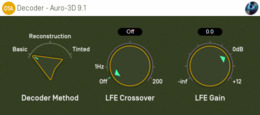
I/O: 4 in, 10 out
This plugin renders high quality Auro-3D 9.1 surround from 3D O1A mixes.
O1A Decoder - Auro-3D 10.1
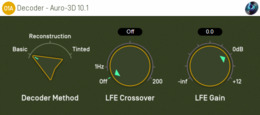
I/O: 4 in, 11 out
This plugin renders high quality Auro-3D 10.1 surround from 3D O1A mixes.
O1A Decoder - Auro-3D 11.1
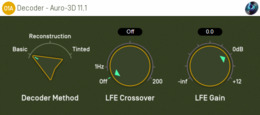
I/O: 4 in, 12 out
This plugin renders high quality Auro-3D 11.1 surround from 3D O1A mixes.
O1A Decoder - Auro-3D 13.1
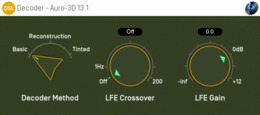
I/O: 4 in, 14 out
This plugin renders high quality Auro-3D 13.1 surround from 3D O1A mixes.
O1A Decoder - IMAX 5.0
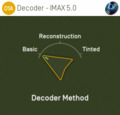
I/O: 4 in, 5 out
This plugin renders high quality IMAX 5.0 surround from 3D O1A mixes.
O1A Decoder - IMAX 6.0
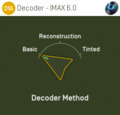
I/O: 4 in, 6 out
This plugin renders high quality IMAX 6.0 surround from 3D O1A mixes.
O1A Decoder - IMAX 12.0
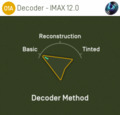
I/O: 4 in, 12 out
This plugin renders high quality IMAX 12.0 surround from 3D O1A mixes.
O1A Decoder - 22.2
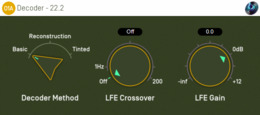
I/O: 4 in, 24 out
AAX: not supported
This plugin renders high quality Hamasaki 22.2 surround from 3D O1A mixes.
O1A Decoder - 3D7.1
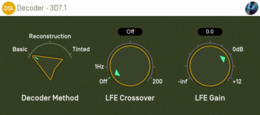
I/O: 4 in, 8 out
This plugin renders high quality 3D7.1 surround from 3D O1A mixes. This layout uses 7.1 hardware but arranges it differently.
O1A Decoder - Cube
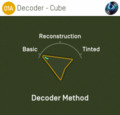
I/O: 4 in, 8 out
This plugin renders high quality eight-channel surround for a cube array from 3D O1A mixes.
O1A Decoder - Hexagon
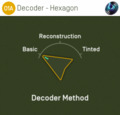
I/O: 4 in, 6 out
This plugin renders high quality six-channel surround for a hexagon array from 3D O1A mixes.
O1A Decoder - Octagon
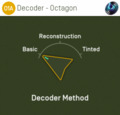
I/O: 4 in, 8 out
This plugin renders high quality eight-channel surround for an octagon array from 3D O1A mixes.
Other Decoders and Converters
O1A Decoder - Quad Binaural
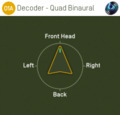
I/O: 4 in, 2 out
This plugin produces simplified binaural audio for use with Quad Binaural systems.
O1A Decoder - UHJ Stereo

I/O: 4 in, 2 out
This plugin renders classic ambisonic UHJ stereo from 3D O1A mixes.
O1A Injector - FuMa

I/O: 4 in, 4 out
This plugin converts FuMa ambisonic audio to O1A ambisonic audio. At first order, FuMa is the same as "classic" B-Format.
Technical Requirements
Please check everything is okay here before purchasing software.Operating System
Supported versions of Microsoft Windows are 10 or 11, 64bit Intel.
Supported versions of Apple macOS are 10.14 to 13.5, 64bit Intel or Apple Silicon.
VST Host
The VST plugins require a VST 2 host with shell plugin support.
These plugins do not work with all VST 2 hosts. They are multichannel plugins and so will not work on VST hosts that only handle stereo. Some of the plugins need large numbers of channels on each track. Check the individual plugins for the channel counts they need. Also note that not all VST 2 hosts can use shell plugins. In particular, at the time of writing shell plugins are not supported in Nuendo 8.
AAX Host
The AAX plugins require Pro Tools Ultimate or Studio.
Due to channel and stem restrictions, not all plugins are supported in AAX. Please see the plugin descriptions for details.
PC Hardware
Please check your PC meets the following requirements:
- Intel Pentium D CPU or better, or Apple Silicon.
- 200MB of free disk space.
Internet Connection Required
This software requires an Internet Connection for license activation and verification.
Successful license verification isn't required every time you use the software, but it is needed during installation and needs to succeed once every couple of weeks to keep the license fresh.
The license can be "revoked" to remove it from one machine so it can be moved on to another. You should also do this if you're updating your system in case the machine appears to have changed identity.
Permissions
You'll need administrator permissions while installing on Windows. The software probably won't install properly using a "restricted" account.
Internet Connection Required
This software requires an Internet Connection for license activation and verification.
Successful license verification isn't required every time you use the software, but it is needed during installation and needs to succeed once every couple of weeks to keep the license fresh.
The license can be "revoked" to remove it from one machine so it can be moved on to another. You should also do this if you're updating your system in case the machine appears to have changed identity.

